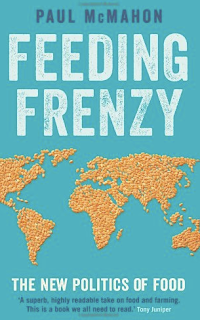Paul McMahon has done an excellent job of providing a thoughtful work on the current state of global agricultural markets. He has reviewed all of the key drivers of future food prices, land, water, bio-diversity, productivity, technology, management, capital usage, and policy and provides a clear road map for what will be the critical issues in agriculture over the next decade. He provides lots of key information but does not overwhelm the reader with facts. He tells a story of a global system that needs repair. It is not that anyone tries to make an inefficient system, but the non-cooperative behavior of many key players ensure that there are still malnourished and starving people.
McMahon shows how governments making food a strategic assets actually makes for a more fragile system. Subsidies in the developed world for farming leads to over production which has to be exported. This makes developed countries dependent on imported food. When there is a food crisis, export restrictions cause a disruption of the trade in grains. Cheap capital has driven the farm industry to large farms in the developed world where as in the undeveloped world cheap labor is not being used efficiently. Trying to provide a one size fits all view to farming may be devastating to Africa where the focus has to be on farm management efficiencies and not capital usage. We are clearly dependent on a few crops and a free trade system which may have a hard time getting food from where it is grown to where it is eaten.
McMahon provides an even-handed view to many of these issues and does not immediately move to blaming corporations or governments. This is a quick read but will change your views on agricultural markets.

No comments:
Post a Comment